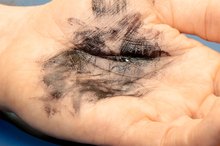Isopropyl alcohol is the main ingredient in rubbing alcohol, a product available at most supermarkets and pharmacies 1. It is noted for its disinfectant properties, but has also been used in solvents and other chemical applications. Isopropyl alcohol as found in rubbing alcohol (which is composed of either 70 percent or 91 percent isopropyl) can be a useful chemical to keep in your home to help destroy organisms such as bacteria, viruses and household pests 1. However, isopropyl can also be dangerous to other forms of life, so it is important to keep it out of reach of young children.
Bacteria
Isopropyl alcohol kills bacteria by damaging the cell walls of one-celled organisms 1. With these cell walls ruptured, bacteria perish quickly, as they can no longer function normally. Spraying a light mist of isopropyl/rubbing alcohol over hard surfaces and allowing to air dry can kill bacteria on that surface 1. Bacteria is also the cause of certain types of fungal infections, such as nail fungus. Soaking feet in a mixture of water and rubbing alcohol can help treat nail fungus in its early stages. After a few weeks of daily soaking, the fungus should be gone.
- Isopropyl alcohol kills bacteria by damaging the cell walls of one-celled organisms 1.
- Soaking feet in a mixture of water and rubbing alcohol can help treat nail fungus in its early stages.
Viruses
Ingredients in Hand Sanitizer
Learn More
In addition to damaging the integrity of cellular walls, rubbing alcohol also denatures proteins, meaning it can also be used to kill viruses on contact. Both viruses and bacteria are less stable when outside of the body or other biological host, meaning that germs on surfaces are far easier to kill than if they were in the body. Rubbing isopropyl alcohol on the skin or spraying it on hard surfaces can kill both bacteria and viruses on those surfaces 1.
Pests
Fleas, ticks and lice can be killed by submerging them in alcohol, in essence suffocating these parasites. An initial spray of isopropyl alcohol can stun pests, making it easier to kill them 1. Materials that have come into contact with parasites (for example, flea and tick combs, pet collars, etc.) can be submerged in isopropyl alcohol to kill parasites or their eggs 1. While not the preferred method for eradicating household pests, rubbing alcohol can help with the process of exterminating these tiny parasites.
It is important to note that dogs and cats could ingest trace amounts of isopropyl alcohol left on furniture or other surfaces in your home 1. Ingesting isopropyl can cause blindness, so homeowners with pets should use isopropyl sparingly, if at all.
- Fleas, ticks and lice can be killed by submerging them in alcohol, in essence suffocating these parasites.
- An initial spray of isopropyl alcohol can stun pests, making it easier to kill them 1.
Humans
How Does Hand Sanitizer Kill Bacteria?
Learn More
Human beings can also be killed by isopropyl alcohol, although this is rare 1. In addition to producing strong, flammable fumes that can damage the lungs in large quantities, this form of alcohol can also prove life-threatening when ingested. Some people ingest this type of alcohol to get drunk; however, this can lead to isopropyl alcohol poisoning 1. This may include symptoms such as blindness, shock and depression of the central nervous system. However, when used correctly, a human faces little risk of health effects resulting from exposure to this chemical.
Related Articles
References
- Up To Date: Isopropyl Alcohol Poisoning
- Texas Agricultural Extension Service- Texas A&M University System: Controlling Fleas
- National Institute on Alcohol Abuse and Alcoholism. Understanding the Dangers of Alcohol Overdose. Updated November 2019.
- Cleveland Clinic. Alcohol Poisoning. Updated October 12, 2017.
- Mangla A, Hamad H, Yadav U, Telfer M. Alcohol abuse and alcoholic liver cirrhosis leading to spontaneous muscle hematoma: an event fraught with danger. Case Rep Gastroenterol. 2015;9(1):93–100. Published 2015 Apr 17. doi:10.1159/000381305
- Johns Hopkins Medicine. Status Epilepticus.
Writer Bio
Tucker Cummings is a freelance writer based in New England. She holds two Bachelor of Arts degrees from the University of New Hampshire and is a member of the Association of Professional Business Writers. Cummings is also a food writer and curates the blog, Brave New Breakfast.









